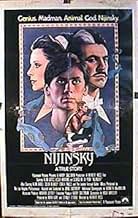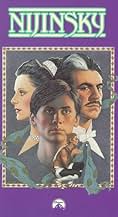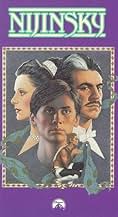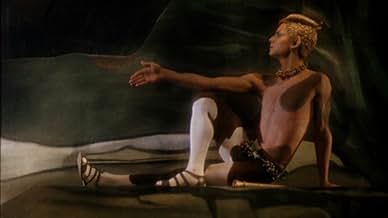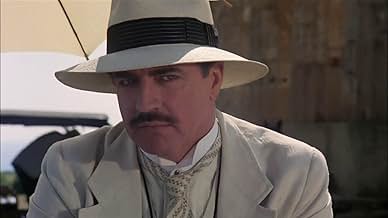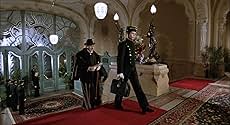Füge eine Handlung in deiner Sprache hinzuThe story of Vaslav Nijinsky, who is widely believed to be one of the greatest ballet dancers of all time. Based on Romola Nijinsky's "Last Years Of Nijinski.The story of Vaslav Nijinsky, who is widely believed to be one of the greatest ballet dancers of all time. Based on Romola Nijinsky's "Last Years Of Nijinski.The story of Vaslav Nijinsky, who is widely believed to be one of the greatest ballet dancers of all time. Based on Romola Nijinsky's "Last Years Of Nijinski.
- Regie
- Drehbuch
- Hauptbesetzung
Tomaso Milian Jr.
- Young Boy on Beach
- (as Tomas Milian Jr)
Empfohlene Bewertungen
The film was made shortly after the death of Romola Nijinskaya, the wife of the legendary dancer, as if the producers just had waited for her death to be able to make the film. It is very carefully done, sticking meticulously to the well documented case as it was lovingly presented by his wife herself in her two books about her famous husband. It's a sad story, of course, if not even like a Greek tragedy, and the film admirably tries to embrace and make the tragedy conceivable, by going into details about the passions of Diaghilev, Nijinsky, Fokine, the lovely Karsavina (the most sympathetic of them all) and Romola. But the chief asset of the film is the great acting by them all, including Ronald Pickup as Stravinsky ('a very dry man' according to Nijinsky, who didn't like him at all,) Alan Badel at his best as the Baron Ginzburg, Jeremy Irons as Fokine, the adorable Carla Fracci as Tamara Karsavina, and above all Alan Bates as a superb Diaghilev, quite human in all his necessary monstrosity as an impresario with too many eccentric characters under his wings, and George de la Pena as an almost painfully true and convincing Nijinsky. To this comes the wonderful ballet performances, including "The Spectre of the Rose" (Nijinsky's tour de force) and "The Afternoon of a Faun", the crucial turning point in his career from only dancer to controversial choreographer. Deserving the highest merit of all is the most admirable reconstruction of the ballets russes at that time with the fabulous art works of Leon Bakst, Diaghilev's unique scenographer, turning all Fokine's and Nijinsky's ballets into sumptuous living fairy tales of fantastic dancing, perhaps most clearly illustrated by Rimsky-Korsakov's "Sheheradzade", which music finally crowns the film in the end, which is needed, since, as I said, it's a sad story, but it couldn't have been made better. The only objection that would be relevant is the failure of making Nijinsky's lapse into madness credible. It was actually a long process, he wasn't definitely past hope until 1917 (4 years after the end of the film), and the main reason was not the crises of his relationships but the impact on him by the First World War. This important piece in the puzzle is missing in the film. Instead you see him ending up in a strait-jacket without further explanation.
It's a great film none the less, and as time goes by it will certainly win the acclaim it deserves as one of the great ballet film classics, second only to "The Red Shoes" 1948 and "The Specter of the Rose" 1946, which actually also is a masked portrait of Nijinsky (see my review of that film).
It's a great film none the less, and as time goes by it will certainly win the acclaim it deserves as one of the great ballet film classics, second only to "The Red Shoes" 1948 and "The Specter of the Rose" 1946, which actually also is a masked portrait of Nijinsky (see my review of that film).
Whatever the facts may have been, the screenplay writers here have chosen to interpret the end of Nijinsky's dazzling career and his descent into madness, as being caused by the end of his romantic relationship with Diaghilev. An interesting premise - that what appeared to most people to be a simple case of a "dirty old man" exploiting a young man's ambition (or perhaps an ambitious young man exploiting an older man's lust), was in fact a genuine love affair. They weren't using each other, they genuinely loved each other.
Sadly, in 1980, it appears the film-makers were not brave enough to explore this fully enough for the film to work. The characters talk about passion a lot, but we don't see it much. Indeed the only love scene between the two men involves a couple of little kisses with a handkerchief held to their lips! How wonderful it would have been to see these two men genuinely passionate with each other - physically and spiritually - and how they managed to turn that passion into great works of art. This way we could understand Nijinsky's devastation when Diaghilev rejects him. As it stands, it seems to come from nowhere.
This is no fault of the actors. Both Alan Bates and George De La Pena do what they can, with the scenes that they have. What a shame the film wasn't made a few years later, when gay relationships could be explored on screen more completely. This could have been one hell of a film. As it is, the ballet reconstructions are excellent and the costumes superb. Performances are strong, with the possible exception of Leslie Browne, who is a little out of her depth here as the scheming rich girl chasing Nijinsky. She fared much better in Herbert Ross' earlier ballet film THE TURNING POINT.
Herbert Ross was a terrific choice to direct the film, having been a professional ballet director and choreographer, and the film has a superb sense of period and great style. But the heart is missing. The racing heartbeats of two men, and two great artists, madly in love.
Sadly, in 1980, it appears the film-makers were not brave enough to explore this fully enough for the film to work. The characters talk about passion a lot, but we don't see it much. Indeed the only love scene between the two men involves a couple of little kisses with a handkerchief held to their lips! How wonderful it would have been to see these two men genuinely passionate with each other - physically and spiritually - and how they managed to turn that passion into great works of art. This way we could understand Nijinsky's devastation when Diaghilev rejects him. As it stands, it seems to come from nowhere.
This is no fault of the actors. Both Alan Bates and George De La Pena do what they can, with the scenes that they have. What a shame the film wasn't made a few years later, when gay relationships could be explored on screen more completely. This could have been one hell of a film. As it is, the ballet reconstructions are excellent and the costumes superb. Performances are strong, with the possible exception of Leslie Browne, who is a little out of her depth here as the scheming rich girl chasing Nijinsky. She fared much better in Herbert Ross' earlier ballet film THE TURNING POINT.
Herbert Ross was a terrific choice to direct the film, having been a professional ballet director and choreographer, and the film has a superb sense of period and great style. But the heart is missing. The racing heartbeats of two men, and two great artists, madly in love.
If you, like me, are a Nijinsky fan, go ahead and watch it
But I have some complaints
The film is great, don't get me wrong, but I felt like it lacked more simple scenes between Diaghilev and Nijinsky More on why they fell in love How it all started They focus a lot on the consequences of this, but not on the reasons of why it happened in the first place
I mean,yeah,love doesn't have a reason to happen and blah blah blah But when we start the movie, they already like each other Personally, I found the film a bit massive, as it lacks lighthearted scenes
I understand that they chose to focus on the tragedy, but if they really showed the reason that made Nijinsky stay, the love between them, I believe the moment where it all falls apart would be even better I would also have liked to have seen a scene of Nijinsky protecting Diaghilev, in addition to just Diaghilev protecting him, and to show Nijinsky's reaction to this protection, too More physical and emotional intimacy beyond arguments
Furthermore, they did not mention anything about WWI, which was a big reason for Nijinsky's downfall, as he was considered an enemy as he was in Belgium, due to his Russian citizenship
Despite this, overall, the film is great The costumes are realistic, the performances, in my opinion, are great and they managed to demonstrate the consequences very well, even with the lack of reasons.
The film is great, don't get me wrong, but I felt like it lacked more simple scenes between Diaghilev and Nijinsky More on why they fell in love How it all started They focus a lot on the consequences of this, but not on the reasons of why it happened in the first place
I mean,yeah,love doesn't have a reason to happen and blah blah blah But when we start the movie, they already like each other Personally, I found the film a bit massive, as it lacks lighthearted scenes
I understand that they chose to focus on the tragedy, but if they really showed the reason that made Nijinsky stay, the love between them, I believe the moment where it all falls apart would be even better I would also have liked to have seen a scene of Nijinsky protecting Diaghilev, in addition to just Diaghilev protecting him, and to show Nijinsky's reaction to this protection, too More physical and emotional intimacy beyond arguments
Furthermore, they did not mention anything about WWI, which was a big reason for Nijinsky's downfall, as he was considered an enemy as he was in Belgium, due to his Russian citizenship
Despite this, overall, the film is great The costumes are realistic, the performances, in my opinion, are great and they managed to demonstrate the consequences very well, even with the lack of reasons.
Acclaimed ballet dancer Vaslav Nijinsky, the "Polish peasant" who became the toast of Europe in the early 1900s, isn't very well served by this meandering biography which looks and sounds good but seems internally stultified. Nijinsky (played as a spoiled child by newcomer George De La Pena) attempts to extend his talents to the choreography of his latest showcase, under the tutelage of his lover and partner Sergei Diaghilev (Alan Bates), but cracks under the enormous pressure to be brilliant; meanwhile, a budding ballerina schemes her way into Nijinsky's arms after the star and his impresario have a romantic falling-out. Director Herbert Ross, apparently still riding the high from his 1977 ballet-themed drama "The Turning Point", has no new ideas on how to stage an electrifying or kinetic dance performance; the music direction is strong, however the magic of a timeless presentation is missing (what should have been the movie's strongest asset is in fact its weakest link). The temperament of artists in general is well-observed (if a bit over-the-top), however the love story between dancer and producer fails to come off. 1980 may still have been too early in the game to show passion between two men; Ross gives us a chaste rendering of it, followed by what seems like years of sniping and jealousy between the couple. Leslie Browne (a hold-over from "The Turning Point") never begins to suggest the cunning ambitions of a woman who hoped to 'change' Nijinsky', while the passion in that heterosexual union is confined to a single scene. What was everyone so bashful about? A brilliant little light show during the end credits is far more sparkling than anything in the rest of the film! *1/2 from ****
Nijinsky (1980) -
I couldn't actually remember whether I had checked the synopsis for this film beforehand and whether it might have been about a horse instead. My Mother certainly insisted on telling me that there was also a horse called Nijinsky all the way through it, despite it obviously being about the ballet dancer.
Either way, I knew nothing about the man, well played by George De La Pena and now I know something. He seemed like a bit of a diva actually and although it was clear that Sergei was using him for his talents, at least to some degree and that their love might not have been true, I felt that the dancer was probably doomed to come to the end that he did due to his passion and determination that would only ever be disappointed.
The character of Sergei, who was the lover and benefactor, didn't look like the Alan Bates I knew. I would still have kissed him though, without the use of a handkerchief between our lips, as was the oddity of their first meeting on screen.
There had always been something roguishly charming about Mr. Bates, especially when he had his beard and that came across in this great and interesting character, which was well delivered.
I would have liked to have seen more of Nijinsky actually dancing, although the Faun performance was a bit odd and lacklustre. More a sort of strange rolling around than the traditional beauty of a ballet that I'm used to. Actually, most of the dances were too strange for me and I was disappointed, having only recently started to get in to the art form via the likes of 'Swan Lake' and 'The Nutcracker', but also 'Car Men' and an old BBC2 performance I saw entitled 'Enter Achilles' from a season they did named '2 Dance'. Perhaps what was shown in this film would be received positively by those that knew more, but for myself as a layman it just came across as a bit forced and daft.
However I would have been very surprised if anyone could choreograph any kind of dance to Igor Stravinsky's (Ronald Pickup) God awful music, as it was performed in this film. It was painful to listen to.
Other than that, I thought that this story of Vaslav Nijinsky's life was produced fairly well. I would definitely have liked more sex and nudity, but I understood the restrictions that the studio would have been under at the time.
However I did also think that it was very poorly lit, making it very dark throughout and therefore lacking in definition at times, or perhaps it may have been the quality of the film used, but it definitely needed something.
In general it was interesting and it kept my attention, which many other films have failed to do. The final moments appeared a bit rushed as if they had sacrificed filming that segment of his life due to time constraints, because it was sad and that did lead me to thinking that it was a poor end for both Nijinsky and the film.
640.89/1000.
I couldn't actually remember whether I had checked the synopsis for this film beforehand and whether it might have been about a horse instead. My Mother certainly insisted on telling me that there was also a horse called Nijinsky all the way through it, despite it obviously being about the ballet dancer.
Either way, I knew nothing about the man, well played by George De La Pena and now I know something. He seemed like a bit of a diva actually and although it was clear that Sergei was using him for his talents, at least to some degree and that their love might not have been true, I felt that the dancer was probably doomed to come to the end that he did due to his passion and determination that would only ever be disappointed.
The character of Sergei, who was the lover and benefactor, didn't look like the Alan Bates I knew. I would still have kissed him though, without the use of a handkerchief between our lips, as was the oddity of their first meeting on screen.
There had always been something roguishly charming about Mr. Bates, especially when he had his beard and that came across in this great and interesting character, which was well delivered.
I would have liked to have seen more of Nijinsky actually dancing, although the Faun performance was a bit odd and lacklustre. More a sort of strange rolling around than the traditional beauty of a ballet that I'm used to. Actually, most of the dances were too strange for me and I was disappointed, having only recently started to get in to the art form via the likes of 'Swan Lake' and 'The Nutcracker', but also 'Car Men' and an old BBC2 performance I saw entitled 'Enter Achilles' from a season they did named '2 Dance'. Perhaps what was shown in this film would be received positively by those that knew more, but for myself as a layman it just came across as a bit forced and daft.
However I would have been very surprised if anyone could choreograph any kind of dance to Igor Stravinsky's (Ronald Pickup) God awful music, as it was performed in this film. It was painful to listen to.
Other than that, I thought that this story of Vaslav Nijinsky's life was produced fairly well. I would definitely have liked more sex and nudity, but I understood the restrictions that the studio would have been under at the time.
However I did also think that it was very poorly lit, making it very dark throughout and therefore lacking in definition at times, or perhaps it may have been the quality of the film used, but it definitely needed something.
In general it was interesting and it kept my attention, which many other films have failed to do. The final moments appeared a bit rushed as if they had sacrificed filming that segment of his life due to time constraints, because it was sad and that did lead me to thinking that it was a poor end for both Nijinsky and the film.
640.89/1000.
Wusstest du schon
- WissenswertesExecutive Producer Harry Saltzman had wanted to make a movie about Nijinsky for many years, first attempting to produce a version in 1970 with partner Albert R. Broccoli. The movie was started, but was never finished, it being cancelled by Broccoli and Saltzman. It is known as Nijinsky: Unfinished Project (1970). It starred Rudolf Nureyev, was written by Edward Albee, and directed by Tony Richardson.
Top-Auswahl
Melde dich zum Bewerten an und greife auf die Watchlist für personalisierte Empfehlungen zu.
- How long is Nijinsky?Powered by Alexa
Details
Box Office
- Bruttoertrag in den USA und Kanada
- 1.047.454 $
- Weltweiter Bruttoertrag
- 1.047.454 $
- Laufzeit
- 2 Std. 9 Min.(129 min)
- Farbe
- Sound-Mix
- Seitenverhältnis
- 1.85 : 1
Zu dieser Seite beitragen
Bearbeitung vorschlagen oder fehlenden Inhalt hinzufügen



